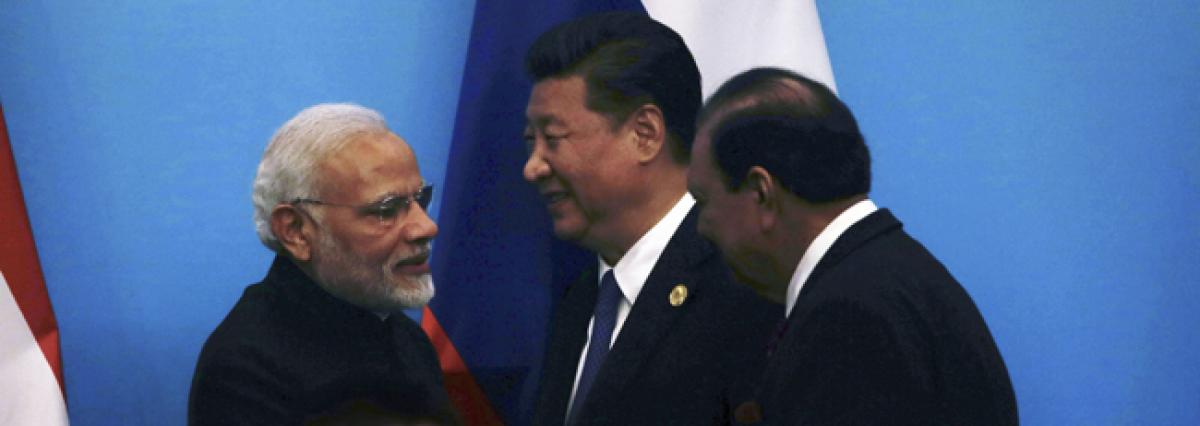Live
- Heavy rains cause disruptions in Tirumala and Tirupati
- Former Soldier Builds Temple for Rajinikanth, Installs New Idol on Superstar’s 74th Birthday
- Mohan Babu’s Daughter Manchu Lakshmi's Viral Post Sparks Controversy Amid Family Disputes
- NIST hosts alumni meet
- Upcoming Telugu OTT Releases: A Treat for Telugu Cinema Lovers in December
- Vedamrit Honey’ launched
- Arjun Das Brings Mufasa to Life in Tamil
- Odisha move to prepare maritime perspective plan
- Jal Jeevan Mission empowering women in rural areas: PM Modi
- Pradhan urges Nadda to set up pharmacy unit in Odisha
Just In
India refuses to endorse China’s One Belt, One Road project


India was the only country in the eight-nation Shanghai Cooperation Organisation on Sunday which refused to endorse China\'s ambitious Belt and Road Initiative for which Beijing has signed pacts with nearly 80 countries and international organisations.
Qingdao/New Delhi: India was the only country in the eight-nation Shanghai Cooperation Organisation on Sunday which refused to endorse China's ambitious Belt and Road Initiative for which Beijing has signed pacts with nearly 80 countries and international organisations.
A declaration issued at the end of the two-day summit of the SCO said Russia, Pakistan, Kazakhstan, Uzbekistan, Kyrgyzstan and Tajikistan have "reaffirmed their support for the Belt and Road Initiative" of China.
However, India refused to endorse President Xi Jinping’s One Belt, One Road (OBOR) project as part of a joint declaration. The move at India’s first summit as a full SCO member was taken in line with New Delhi’s policy of not compromising on territorial issues, top sources in the government said.
India has termed OBOR, also called the Silk Road project, as a threat to its sovereignty over concerns on its flagship project — the China Pakistan Economic Corridor (CPEC), which passes through Pakistan-occupied Kashmir. The 3,000-km CPEC is aimed at connecting China and Pakistan with rail, road, pipelines and optical fibre cable networks.
It will connect Xinjiang province with Gwadar port, providing China with access to the Arabian Sea. The project, when completed, would enable China to route its oil supplies from the Middle East through pipelines to Xinjiang, cutting considerable distance for Chinese ships to travel to China.
India had also stayed clear of the joint communique by member countries during the foreign ministers’ meet in Beijing in April this year. Prime Minister Narendra Modi attended the 18th SCO Summit in Qingdao over the weekend, marking India’s first participation as a full member of the grouping.
Modi held a bilateral meeting with Xi Jinping on the sidelines of the summit and shook hands with Pakistan President Mamnoon Hussain. At the restricted session of the SCO Summit, Modi floated the concept of SECURE: 'S' for security for citizens, 'E' for economic development, 'C' for connectivity in the region, 'U' for unity, 'R' for respect of sovereignty and integrity, and 'E for environment protection.
"We have again reached a stage where physical and digital connectivity is changing the definition of geography. Therefore, connectivity with our neighbourhood and in the SCO region is our priority," Modi said.
Welcoming India and Pakistan’s entry as full members of the SCO, host Xi said the participation of the two neighbours would add to the grouping’s strength. "We should reject the Cold War mentality and confrontation between blocs and oppose the practices of seeking absolute security of oneself at the expense of the security of other countries, so as to achieve security of all," he said.

© 2024 Hyderabad Media House Limited/The Hans India. All rights reserved. Powered by hocalwire.com






